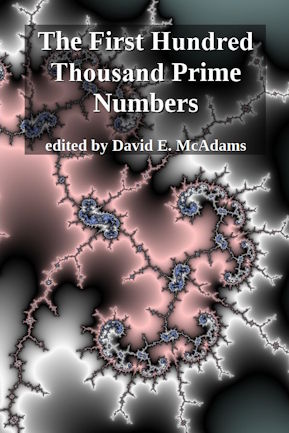
Click image to see more pages.
|
The First Hundred Thousand Prime Numbers
edited by David E. McAdams
Prime numbers are the building blocks of the integers, numbers that can only be divided evenly by one and themselves. A prime number is any whole number greater than one that has no positive divisors other than 1 and itself. For example, 5 is a prime number: it cannot be evenly divided by 2, 3, or 4, only by 1 and 5.
Since the time of ancient Greece, prime numbers have intrigued and challenged mathematicians. Around 276 BCE, the Greek scholar Eratosthenes of Cyrene developed a clever algorithm to find prime numbers, known as the Sieve of Eratosthenes, a technique so elegant and effective that it remains a staple in mathematics classrooms more than two thousand years later.
In modern times, prime numbers continue to capture the imagination of researchers and students alike. They lie at the heart of number theory and play a critical role in modern digital security. From secure internet transactions to encrypted messaging, prime numbers are essential to cryptographic algorithms that protect our digital lives.
The First Hundred Thousand Prime Numbers is a curated reference for learners, educators, programmers, and number enthusiasts. It lists, in order, the first 100,000 primes—from the smallest, 2, to the 100,000th, which is 1,299,709. Whether you are searching for patterns, verifying algorithms, or simply marveling at the silent rhythm of primes as they rise ever upward, this volume offers a practical and fascinating glimpse into the infinite tapestry of mathematics.
Perfect for study, programming, teaching, or inspiration, this book is both a tool and a tribute to one of nature’s most enduring numerical mysteries.
|

